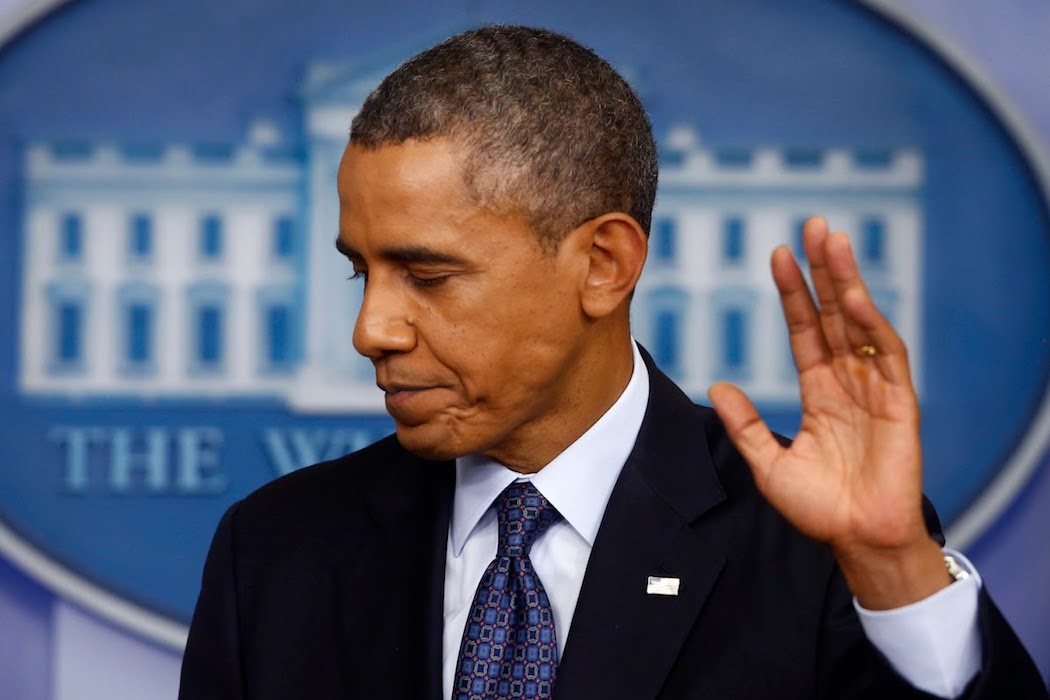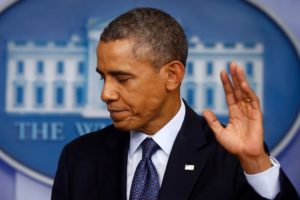If there’s one thing that characterizes the Obama Presidency, it’s that Obama is forever a man at odds with himself. He tries to create a prosperous economy by penalizing prosperity. He tries to create jobs by imposing new costs on businesses. He tries to solve our debt problem by increasing spending. He tries to make healthcare more affordable through policies that increase the demand and reduce the supply.
And now, when it comes to our international relations, this man of irreconcilable contradictions suddenly wants to talk big and play Commander in Chief of a superpower, after years of doing his level best to reduce America from superpower status. The result is an America foreign policy that is completely confused and ineffectual, perhaps more so than in any time in history, and as such is impotent to intervene in any meaningful way in global affairs.
But then again, why should we want a government that forever seeks to intervene in global affairs?
We supported a new Egyptian government, only to see that overthrown. We withdrew from Iraq, reassured by the White House that the situation was stable and in good hands, but before long Islamic extremists reappeared, and the Iraqi security soldiers, who we spent so much time and money training, dropped their guns and fled at the first sight of hostilities, as Sen. Rand Paul so adeptly put it. We told Syria’s President Assad to step down after he gassed his people, and he laughed at us. We told Vladimir Putin not to touch the Ukraine, with Obama promising that there would be “costs to pay for any invasion,” but Putin laughed at us too, knowing he had nothing to fear from our President, even though Obama’s one skill in life is imposing “costs to pay” on other people. Then we were laughed at by the Boko Haram group that kidnapped those 200 girls in Africa (you know, the hashtag girls?), before we lost interest in that after a few days and a few selfies from celebrity Twitter slacktivists, including the First Lady, looking solemn and glum as they did their part for humanity by posting pictures of themselves holding up a placard.
But we’re used to being laughed at, because Iran has been laughing at us for years (mostly since we neutered and then removed Saddam Hussein, oops!), just as North Korea has been laughing at us ever since they hoodwinked Madeline Albright and continued developing their nuclear technology after they promised her they wouldn’t, to the surprise of nobody outside of the Clinton Administration.
And now, once again, what a shock, a situation involving Israel and one of its many enemies is quite literally blowing up right before us, with Israel knowing that it can expect next to no support from us, and their enemies, empowered by American “foreign aid,” are all too eager to test the limits of American indulgence.
It’s a comprehensive catastrophe of epic proportions. Right?
If so, why can nobody identify how this has or will affect the lives of any Americans? Cold War Republicans like Sen. John McCain like to mock the libertarian conservatives who say that we should not be global police officers, and should not meddle in the affairs of other nations where there is no national interest. These relics accuse non-interventionists of favoring a “Fortress America” approach, where the rest of the world is left to its own devices to solve its own problems, while America isolates itself between its two oceans (and porous borders) and simply worries about the lives of average Americans. They happen to be right. Because if an interventionist foreign-policy built around muscular hegemony is so important to American interests, and foreign-policy failures have such great implications, then why are these interventionists unable to explain how any of these repeated failures will impact us?
The closest they come to making a case is to offer vague allusions to historical examples that have barely the slightest resemblance to present circumstances, the most popular of which tend to concern either Hitler or Pearl Harbor. But no tyrant today represents anything approaching the same threat of global domination as did Hitler, and none of these conflagrations present a threat even remotely analogous to a Pearl Harbor. Sorry, but bad things happening today are not always comparable to the worst things that happened in history.
And if we are going to talk about history, perhaps we should talk about why so few of our policymakers on both sides of the aisle seem not to have learned the lessons of Vietnam. The official position of the State Department then was that we had to engage the Soviet Union globally, which meant fighting communism in every little nook and cranny in which it manifested its ugly head. We were told that Vietnam was worth thousands of American deaths because if Vietnam were to fall to the Communists, the fate of even more Americans would be imperiled. Then we watched as 50,000 of our soldiers were killed, and we had to pull out ignominiously having accomplished nothing, and the Communists took over after all. And then what happened? Nothing. No Americans were ever worse off due to communist domination of Vietnam. But the lives affected by all those soldiers lost is beyond counting.
For every example one can give where global interests affected American interests, one can give countless others where those interests were not affected at all. I’m not really sure how we got it into our collective heads that America has this long and proud tradition of intervening in the affairs of other nations with good results. Indeed, America has as an even greater history of non-intervention than intervention. We did not intervene in the Boer Wars, the Crimean War, the Russo-Japanese War, the Napoleonic Wars, or anybody’s civil war, or basically any other conflict until recently. Why would we have? For most of our history we simply let the rest of the world deal with its own problems while we took care of ourselves and grew to become the most prosperous nation in history. This is a blueprint we should fast consider readopting.
Yet, surprisingly few people seem inclined to do so. Both Republicans and Democrats have their share of talking heads who are more than eager to have us exert our influence by whatever means necessary every time some fire lights up somewhere in the world, even when they cannot identify any concrete American interests beyond the usual platitudes involving “justice” and “democracy” and a shared revulsion at “tyranny.” When those people are on the Left the media calls them “interventionists” who seek “humanitarian” action, because that makes it sound like they’re well-intentioned and trying to help. When they’re on the Right they’re called “war hawks” or “neocons” or “imperialists” or “fascists”, because that makes them sound evil and worthy of opprobrium. But they’re all the same thing.
Obama, for his part, does seem to agree with these groups on substance, but ever since his meddling in Libya backfired so humiliatingly he has lacked the stomach for military intervention. That’s a good thing.
Granted, President Obama’s “talk big and do nothing” approach does make us a laughingstock. For the sake of his own credibility (which he may actually need someday) he should simply come out and declare that we’re not going to interfere in the affairs of Russia and the Ukraine, and Syria, and whatever other countries are blowing up at the moment, that we have our own problems that need solving, and that the rest of the world has to be responsible for itself. Instead he talks with all the bluster of a Theodore Roosevelt, but with the authority of an already discredited Neville Chamberlain, and the rest of the world’s leaders know that the only thing they have to fear from him is that he will become disappointed in them, just as he is so often disappointed with the rest of us.
And again, so what? For all intents and purposes, our foreign policy has basically been to exert no meaningful influence in any of these matters, but with the exception of the Americans who lost their lives when they chose to fly through a known warzone, no American lives have been disturbed, and there’s no real reason to think any will. And just as importantly, no costly new wars have started. The libertarians, at least thus far, have been proven right. America does not need to forever threaten the global community with force because only rarely do the troubles of the global community threaten Americans.
Thus it can be credibly said that at least on foreign policy, Barack Obama has by and large been the president libertarians have hoped for, though more by naiveté than nuance, more by default than by design.



